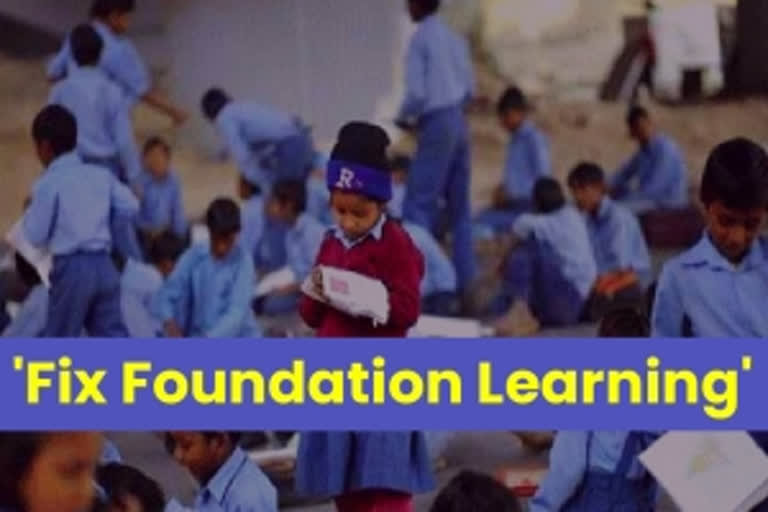Hyderabad: Twenty years ago, when the government launched the Sarva Shiksha Abhiyan, one in every five children in the country wasn’t enrolled in elementary school.
Today, almost 99 per cent of our children are enrolled in schools and that is a significant achievement and the necessary first step towards better education. Unfortunately, this access to schooling has not resulted in desired learning outcomes.
It is a well-established fact that those who do not acquire foundational learning skills at an early stage are unable to catch up later and some of them, eventually, drop out of the education system.
Good quality education, particularly foundational learning, is critical to human capital and economic growth.
The draft National Education Policy (NEP) – the first update in almost 30 years – identifies early childhood education (ECE) and foundational learning (FLN) at the root of the learning crisis that we are facing today.
The NEP states, ‘our highest priority must be to achieve universal foundational literacy and numeracy in primary school and beyond by 2025.'
The rest of the policy will be largely irrelevant for such a large portion of our students if the most basic learning (reading, writing, and arithmetic at the foundational level) is not first achieved.
This strong focus in the draft NEP on FLN can be the much-needed nudge to come up with comprehensive guidelines that can be prepared by the Centre and shared with the states to be used as a framework and create their own customized holistic FLN program.
In fact, the central government should now quickly pass the draft NEP through the legislature and implement its recommendation.
It needs to formulate a time-bound strategy for foundational learning while giving autonomy and funding to the states to create their plans to universalise foundational learning in their respective state.
To begin with, all children must learn to read by class 3, as it is the foundation for lifelong learning and development.
'Shiksha ki ABC' a campaign launched by the Central Square Foundation, urges parents and guardians to ensure that their wards are able to read and comprehend text by the time they are in class 3.
Prioritising foundational learning should lead to the merging of pedagogical inputs from educationists with systemic transformation and having independent bodies to evaluate the performance of the program at all levels.
Reliable, measurable and comparable data should be available so that on a regular basis there can be monitoring pertaining to the alignment of policies, goals, budget and all stakeholders (teachers, students, school administration and parents).
The absence of foundational skills hits the disadvantaged the most, as they are mostly unable to make up for the lack of quality education.
Read: Primary school teacher sacked for using forged documents to secure job
Further, 65 per cent of Indians live in rural areas where there’s a lack of infrastructure.
There’s also a nationwide lack of definite goal-setting done for teachers, headteachers, middle management, and district and state officials as well as an absence of performance indicators for evaluating them.
The challenge is that our capacity to deliver quality education is weak and we do not have the resources to simultaneously focus on multiple things.
Our school curriculum does not match the student’s capabilities.
The education system has to move towards igniting curiosity and problem-solving.
The NEP sets a target of ensuring that all children in the age group of three to six have access to high-quality early childhood education by 2025.
Having a holistic classroom instruction package customised to meet the needs of every state and district and an implementation plan that focuses on teaching approaches, tools for teachers and students, tests, training on content and delivery, and teacher support can help us achieve this target.
Improvement in elementary education is crucial for India to cement its position as a global leader. And the NEP rightly observes that foundational learning opens up opportunities for better income, health, sanitation, safety, and so on.
It is the best investment that India can make for its children’s and the nation’s future.
Political will, community participation and mass mobilisation can together prioritise foundational learning at the national level.
We should not let enrolment numbers, syllabus completion and pass percentages hold the future of our children as a hostage.
After all, today’s primary school students will join the workforce in the next decade, and to reap the economic benefits of this demographic dividend, we need a strong foundation.
A recent World Bank report reveals that 53 per cent of all children in low- and middle-income countries suffer from learning poverty, and are unable to read and understand a simple text by the age of 10.
To counter this, the World Bank is focusing on cutting down the learning poverty rate by half within this decade. It is an ambitious goal for India and the draft NEP can give us the right direction towards achieving it.
Also Read: Education: A tool for development and lifelong learning



